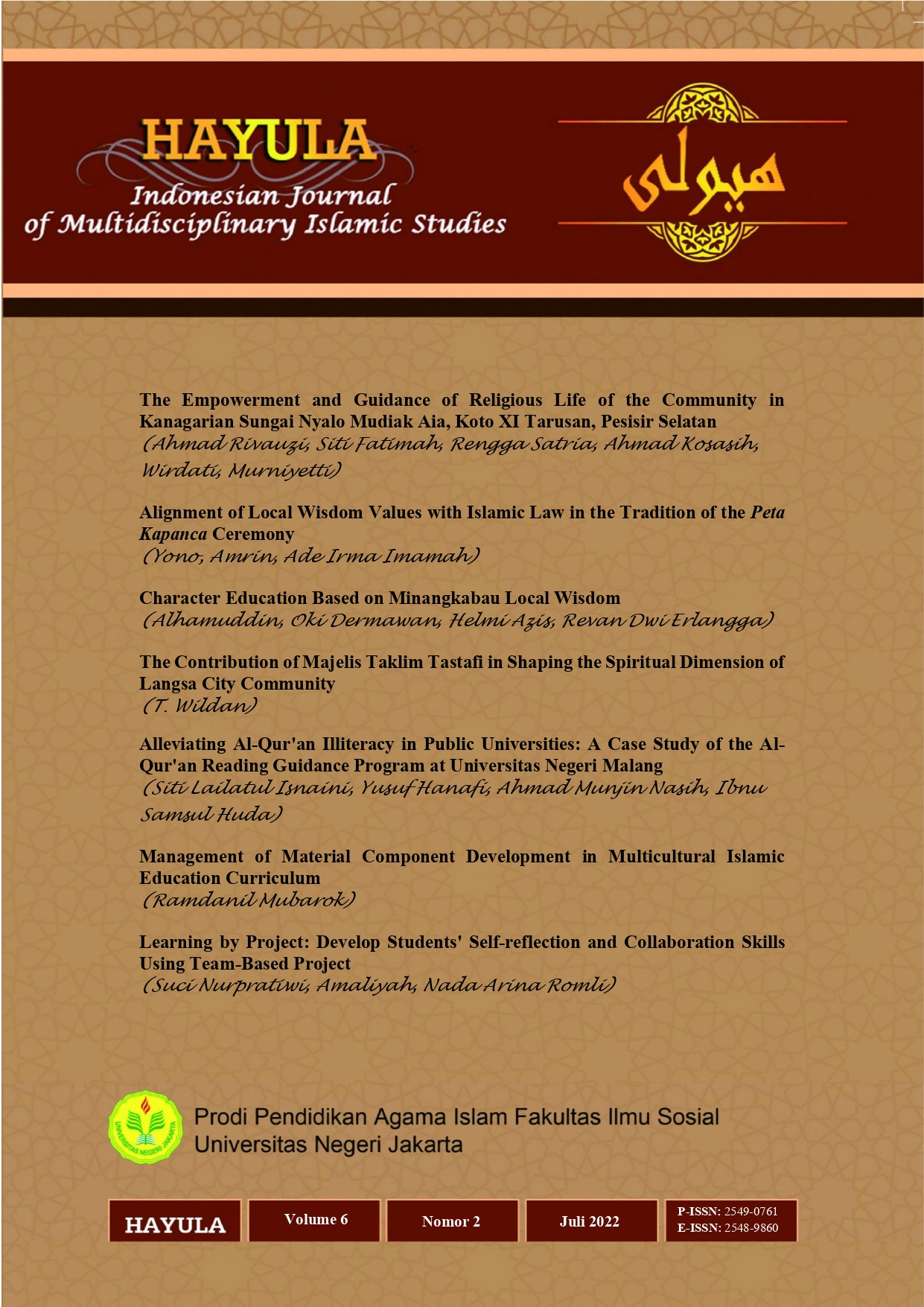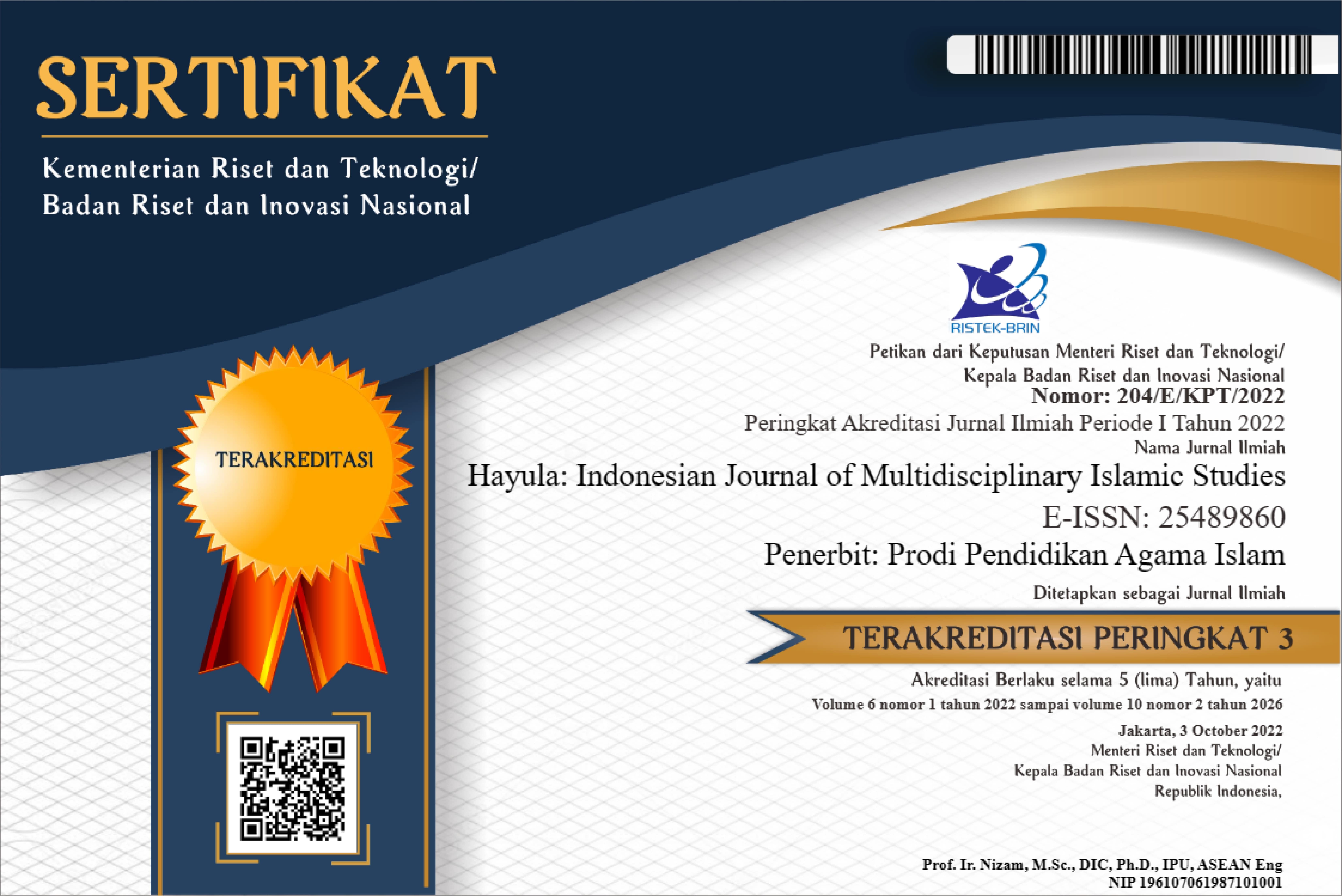Learning by Project: Develop Students' Self-reflection and Collaboration Skills Using Team-Based Project
research
DOI:
https://doi.org/10.21009/hayula.006.02.07Keywords:
team-based project, self-reflection, collaborationAbstract
This study aims to analyze the development of self-reflection and collaboration skills of students through the implementation of a team-based project model in learning for micro-teaching courses. The research was conducted at the State University of Jakarta, with the research subjects were 41 students. Data collection techniques through observation, documentation, interviews, and self-reflection questionnaires. The results showed that 72.1% of students always evaluate their performance and try to do better in teaching practice based on self-reflection results. The aspect that needs to be improved is speaking skills in front of the class (public speaking). Meanwhile, student collaboration skills have shown to be good, as indicated by the synergy in identifying, researching, analyzing, and formulating answers and solutions to the problems found and stated in the project report.
References
Apriono, D. (2013). Pembelajaran Kolaboratif. Diklus, XVII(1), 293.
Aulia, R. N., Mardhiah, I., Gunawan, A., & Isnaini, D. E. N. (2018). Contribution Of Education Culture In Pesantren In Tackling Environmental Damage In Indonesia. In Proceeding International Conference on University and Intellectual Culture (Vol. 1, No. 1, pp. 44-53).
Çimer, A., Çimer, S. O., & Vekli, G. S. (2013). How does Reflection Help Teachers to Become Effective Teachers? International J. Educational Research, 1(4), 134.
Dewi, A. P., Putri, A., Anfira, D. K., & Prayitno, B. A. (2020). Profil Keterampilan Kolaborasi Mahasiswa pada Rumpun Pendidikan MIPA. Pedagogia Jurnal Ilmu Pendidikan, 18(1), 58.
Hosnan. (2014). Pendekatan Saintifik dan Kontekstual dalam Pembelajaran Abad 21: Kunci Sukses Implementasi Kurikulum 2013. Ghalia Indonesia.
Permendikbud Nomor 20 Tahun 2016 tentang Standar Kompetensi Lulusan, Pub. L. No. 20, 8 (2016).
Kumalaretna, W. N. D., & Mulyono. (2017). Kemampuan Komunikasi Matematis Ditinjau dari Karakter Kolaborasi dalam Pembelajaran Project Based Learning (Pjbl). UJMER: Unnes Journal of Mathematics Education Research, 6(2), 197.
Kustandi, C., Ibrahim, N., & Muchtar, H. (2019). Virtual Reality Based on Media Simulation for Preparing Prospective Teacher Education Students. International Journal of Recent Technology and Engineering (IJRTE), 8(IC2), 400.
Lestari, S. M. P. (2019). Perbedaan Tingkat Refleksi Diri Dalam Pembelajaran Mahasiswa Fakultas Kedokteran Universitas Malahayati Tahun 2019. Jurnal Ilmu Kedokteran Dan Kesehatan, 6(4), 258.
Lisiswanti, R. (2013). Refleksi: Pentingkah Bagi Dosen Pendidikan Kedokteran? Jurnal Kedokteran (Juke), 3(2).
Majid, A., & Rochman, C. (2014). Pendekatan Ilmiah dalam Implementasi Kurikulum 2013. PT Remaja Rosdakarya.
Mathew, P., Mathew, P., & Prince, J. P. (2017). Reflective Practices: A Means to Teacher Development. Asia Pacific Journal of Contemporary Education and Communication Technology (APJCECT), 3(1), 126.
Murniarti, E. (2016). Penerapan Metode Project-Based Learning dalam Pembelajaran. In Universitas Kristen Indonesia.
Nadhiroh, P. S., & Pujiriyanto. (2020). Keterampilan Kolaborasi Mahasiswa Teknologi Pendidikan dalam Mata Kuliah Kewirausahaan Berbasis Proyek. Jurnal Epistema, 1(1), 33.
Nugraha, I., Widodo, A., & Riandi. (2020). Refleksi Diri dan Pengetahuan Pedagogi Konten Guru Biologi SMP Melalui Analisis Rekaman Video Pembelajaran. Jurnal Pendidikan Sains Indonesia, 8(1), 15.
Nurpratiwi, S. (2021). Analysis Self-Reflection of Prospective Teacher-Students on TPACK Ability Through Case-Based Learning Model. IJECA: International Journal of Education and Curriculum Application, 4(3), 214. https://doi.org/https://doi.org/10.31764/ijeca.v4i3.5711
OECD. (2016). Country Note-Skills Matter: Further Results from the Survey of Adult Skills. https://www.oecd.org/skills/piaac/Skills-Matter-Jakarta-Indonesia.pdf
Oktaria, D. (2015). Refleksi Diri Sebagai Salah Satu Metode Pembelajaran di Fakultas Kedokteran. Prosiding Seminar Presentasi Artikel Ilmiah Dies Natalis FK Unila Ke 13, 76–82.
Pannen, P. (2020). Case-base Learning dan Project-based Learning.
Rahman, B. (2014). Refleksi Diri dan Peningkatan Profesionalisme Guru. Jurnal Paedagogia, 17(1), 2.
Saenab, S., Yunus, S. R., & Husain. (2019). Pengaruh Penggunaan Model Project Based Learning Terhadap Keterampilan Kolaborasi Mahasiswa Pendidikan IPA. Jurnal Biology Science & Education, 8(1), 30.
Septikasari, R., & Frasandy, R. N. (2018). Keterampilan 4C Abad 21 dalam Pembelajaran Pendidikan Dasar. Jurnal Tarbiyah Al-Awlad, 8(2), 110.
Sudjimat, D. A. (2016). Implementation Of Project Based Learning Model In Mechanical Machining Skills Package Of Vocational High School. AIP Conference Proceedings 1778, 030024–1.
Sugiyono. (2010). Metode Penelitian Pendidikan. Alfabeta.
Suryarini, D. Y., & Bahtiar, R. S. (2018). Implementasi Micro Teaching dengan Pembelajaran Tematik untuk Mengetahui Tingkat Teacher’s Self-Efficacy Mahasiswa PGSD. In P. Pramulia, A. M. Fanny, Atnuri, D. Prastyo, & W. Susiloningsih (Eds.), Profil Pendidik di Era Revolusi Industri 4.0 (p. 41). Adi Buana University Press.
Yulianto, A., Fatchan, A., & Astina, I. K. (2017). Penerapan Model Pembelajaran Project Based Learning Berbasis Lesson Study untuk Meningkatkan Keaktifan Belajar Siswa. Jurnal Pendidikan: Teori, Penelitian, Dan Pengembangan, 2(3), 448.
Downloads
Published
How to Cite
Issue
Section
License
Authors who publish with this Journal agree to the following terms:
- Author retain copyright and grant the journal right of first publication with the work simultaneously licensed under a creative commons attribution licensethat allow others to share the work within an acknowledgement of the work’s authorship and initial publication of this journal.
- Authors are able to enter into separate, additional contractual arrangementfor the non-exclusive distribution of the journal’s published version of the work (e.g. acknowledgement of its initial publication in this journal).
- Authors are permitted and encouraged to post their work online(e.g. in institutional repositories or on their websites) prior to and during the submission process, as it can lead to productive exchanges, as well as earlier and greater citation of published works.
Users/public use of this website will be licensed to CC BY







